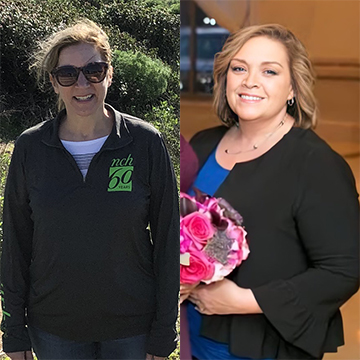Sisters encourage other women to learn their risks of breast cancer
October 15, 2020

It’s hard to miss that October is Breast Cancer Awareness Month. Pink ribbons pop up everywhere―from products in the grocery stores to NFL football games. While spreading awareness is important, getting women to follow through on their annual testing is the ultimate goal.
According to the American Cancer Society, “Women ages 40 to 44 should have the choice to start annual breast cancer screening with mammograms (X-rays of the breast) if they wish to do so. Women age 45 to 54 should get mammograms every year. Women 55 and older should switch to mammograms every two years, or can continue yearly screening.”
Understandably, many women suffer great anxiety facing their annual mammogram, even when it’s not during a pandemic. It’s important to know that NCH has gone to great lengths to ensure all patients entering facilities encounter a safe and protected environment. Everyone who comes to an NCH facility is screened for COVID-19, and has their temperature taken. Everyone must wear a mask. NCH has increased the frequency of all cleaning, using products that will kill off any traces of COVID-19, and has screened off certain areas of waiting rooms and treatment areas and spaced out departments to ensure social distancing.
“We follow the best practices for safety recommended by the Centers for Disease Control and National Institutes for Health, and hope to ease some of those COVID-19 anxieties and reassure women it is safe for them to keep up with their mammogram schedule,” says Heidi Wiltse, R.N., BSN, OCN, ONN-CG, NCH Breast Program Manager.
This summer NCH announced a new tool in the breast cancer fight. The NCH High Risk Breast Clinic (at 880 West Central Road, Suite 5000 in Arlington Heights) uses the latest technology and evidence-based medicine to evaluate patients’ personal and family history.
Every woman who comes to an NCH Breast Imaging Center for screening receives a complimentary risk assessment before her mammogram is performed. If the patient is found to have an elevated lifetime risk for developing breast cancer, she will be advised to visit the High Risk Breast Clinic.
It’s important to understand that women are not referred to the clinic due to something discovered on a mammogram. Rather, they are referred because their risk level for future occurrence is higher than average.
The clinical side of the high-risk program is run by Nurse Practitioner Wiltse, and if necessary, patients will have a follow-up with a breast surgeon.
All women referred to the High Risk Breast Clinic receive a clinical breast exam, education about breast self-exams, assessment of breast cancer risk, including risk of carrying a genetic mutation, a personalized surveillance plan and information about prevention strategies, including lifestyle modifications.
We spoke to two sisters who were recently referred to the clinic: Michelle Calzaretta, 53, Rolling Meadows resident and Estelle Gonzalez, 55, of Des Plaines, to hear their stories.
The sisters keep up with their regularly scheduled mammograms and have shared they felt very safe during the entire process with no concerns about COVID-19. Both were informed about the clinic via their mammogram technician. Gonzalez was referred because of family history, and Calzaretta, who was adopted as a baby, because of her lack of knowledge of her complete family history.
Gonzalez recommends participation in the high-risk program. “Too many women have suffered from breast cancer that may have been prevented if caught early on,” she says. “I have two daughters. If my results find some type of genetic mutation or gene, my daughters could potentially be at risk. They could then receive testing as well and be better prepared for the future.”
Calzaretta was equally as positive about the new clinic. “How lucky are we to have this type of testing right here in our community,” she says. “I was adopted and did not know my medical history until I was into my 30s. I still only know about my birth mother’s side of the family. The results of this test could make a big difference in my life as well as in my children’s.”
Calzaretta adds, “This has been a really easy process. Everyone has gone out of their way to make it very simple. Now that I await my results, I am a little nervous, but am also confident that if I do carry the genetic mutation there are the right specialists here at NCH to help me handle things.”
Gonzalez was also very encouraging. “I highly recommend annual screenings,” she says. “There is no reason to NOT do this on an annual basis. This process has been extremely simple and Dr. Hansen made a huge impression on me. She was so kind, warm and welcoming. She made me feel very comfortable. The entire staff has made this process simple. It’s here for us. If the risk is there and you qualify, don’t hesitate, GO!”
For more information on the NCH High Risk Breast Clinic call 847-618-3800.
No case is the same; results may vary.